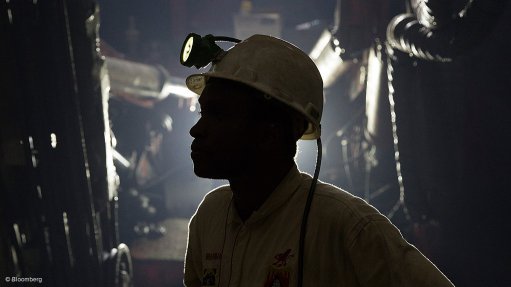
Photo by: Bloomberg
JOHANNESBURG (miningweekly.com) – South African gold mining companies are most exposed to the risk of further upward pressure on wages following the agreement reached this week between striking workers and the country's platinum miners, ratings agency Fitch Ratings said on Thursday.
The recent deal, which would see Anglo American Platinum lifting total wage costs by 8.4% a year for three years, would have a material impact on each company’s results, but was also likely to add to pressure for fresh wage agreements in other areas of the mining industry.
“Gold mining companies could face the biggest impact as they are at least as labour-intensive as platinum miners, but less profitable and with higher commodity price risks.
“This is largely owing to the fact that platinum is predominantly an industrial metal and South Africa produces around 70% of the world's supply. Rising production costs are, therefore, more likely to feed through into platinum prices than gold, where pricing is influenced far more by its use as an investment or inflation hedge and South Africa controls a smaller proportion of global supply,” the agency noted.
Gold miners reached a new two-year pay deal in September, which was followed by a recent court ruling stating that any new strike would be unprotected, theoretically allowing the company to dismiss workers.
Fitch said this was likely to prevent immediate strike action, but unprotected strikes were possible, particularly as large-scale firings would probably be considered “politically unacceptable”.
Iron-ore and coal miners were better positioned to deal with potential wage issues, as labour only accounted for around 20% of total costs and owing to the strong local demand for these commodities.
Higher wage demands were also likely to continue in other sectors, including manufacturing, construction, transport and utilities.
“While the platinum miners' settlement could be used as a negotiating benchmark by unions in these sectors, labour costs for these companies tend to be a significantly lower proportion of total costs.
“However, if the length of the platinum miners' strike – around five months – were also to be repeated in other sectors, the disruption caused would have a much more significant impact,” Fitch explained.
Fitch’s comments came as members of the National Union of Metalworkers of South Africa prepared to embark on industrial action in the engineering and metals sector from July 1.
This followed a deadlock in negotiations, which started three months ago, executed under the auspices of the Metal and Engineering Industries Bargaining Council.
Fitch cautioned that, from a sovereign perspective, increased strike activity and high wage demands represented negative supply-side shocks to the economy, with a longer-term risk that higher wages and poor labour relations would reduce the incentive for mining companies to invest.